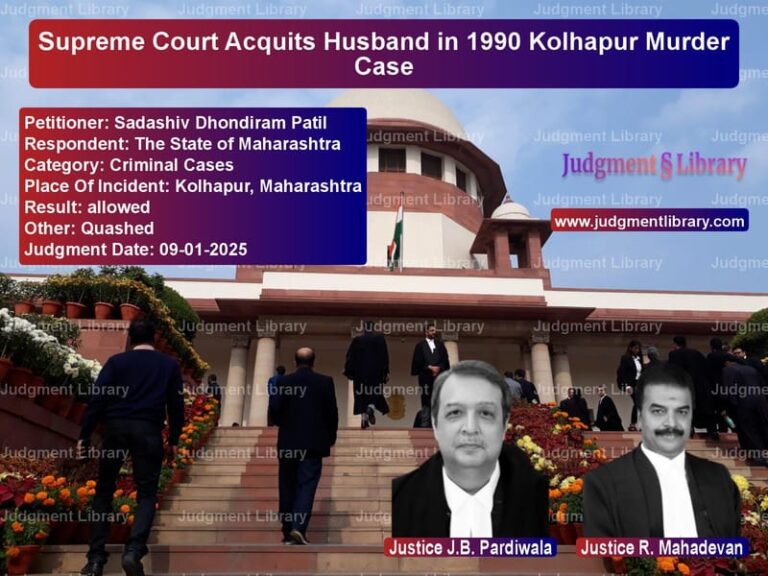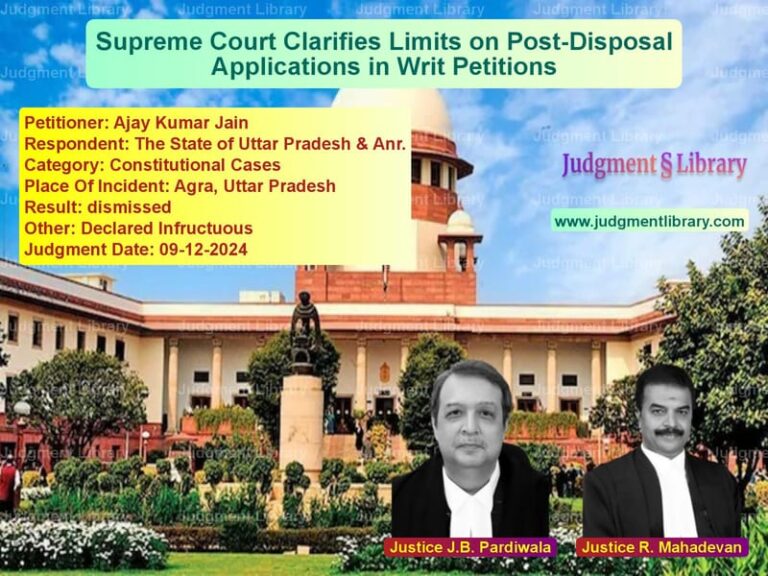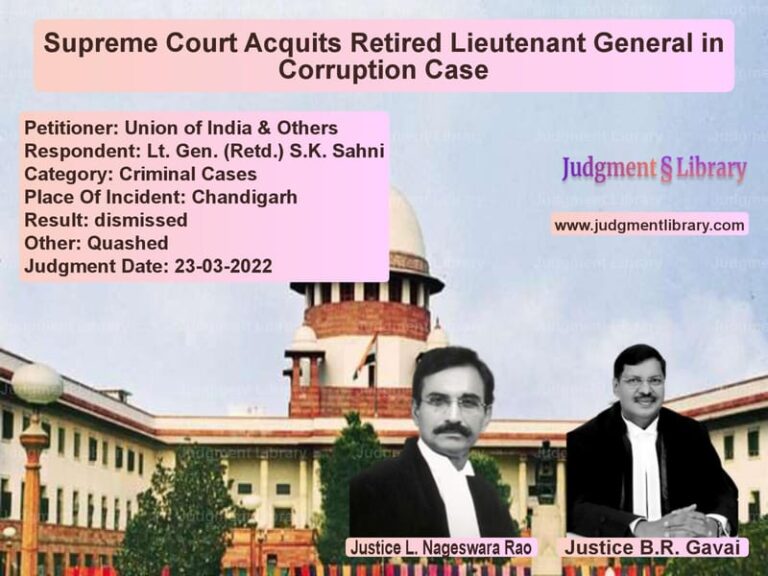Election Nomination Dispute: Supreme Court Reinstates MLA’s Victory
The Supreme Court of India recently ruled in a significant election-related case, Dasanglu Pul v. Lupalum Kri, deciding on the validity of a candidate’s nomination and the consequences of non-disclosure of spousal assets in election affidavits. The case involved an election petition challenging the validity of the appellant’s nomination and its impact on the election result.
Background of the Case
The appellant, Dasanglu Pul, was elected from the 45-Hyuliang (ST) Assembly Constituency in Arunachal Pradesh during the 2019 elections. She contested and won against the respondent, Lupalum Kri, by securing 5,663 votes compared to the respondent’s 4,591 votes, winning with a margin of 1,072 votes.
The respondent challenged the election by filing an election petition before the Gauhati High Court, Itanagar Bench, claiming that:
- The appellant had failed to disclose her deceased husband’s assets in her election affidavit (Form 26).
- The failure to disclose the properties of her spouse amounted to a defect of a substantial character.
- The Returning Officer had improperly accepted the appellant’s nomination, materially affecting the election result.
The High Court ruled in favor of the respondent, declaring the appellant’s election null and void under Section 100(1)(d)(iv) of the Representation of the People Act, 1951, stating that the nomination was improperly accepted. Aggrieved by this judgment, the appellant approached the Supreme Court.
Legal Issues Raised
- Whether the non-disclosure of the deceased husband’s assets in Form 26 was a defect of a substantial character.
- Whether the acceptance of the appellant’s nomination was improper under the Representation of the People Act.
- Whether the non-disclosure of assets materially affected the election result.
- Whether the High Court was justified in annulling the election on the basis of non-disclosure.
Arguments by the Appellant (Dasanglu Pul)
- The non-disclosure of her husband’s assets was not intentional, as she believed she had no claim over them.
- Under the Mishmi tribe’s customary law, only the first wife of a deceased husband inherits the property, and she was not the first wife of her late husband.
- The nomination form required disclosure of the assets of a living spouse, and since her husband had passed away, she was not required to list his assets.
- The High Court had incorrectly applied the principle laid down in Kisan Shankar Kathore v. Arun Dattatray Sawant (2014), as that case involved a living spouse.
- The non-disclosure did not materially affect the election result, as she won with a comfortable margin.
Arguments by the Respondent (Lupalum Kri)
- The non-disclosure of the husband’s assets was a deliberate attempt to mislead voters.
- The Representation of the People Act mandates full disclosure of assets, including those of a deceased spouse, if the candidate has a claim over them.
- The legal heir certificate issued to the first wife was set aside, and the inheritance rights were still under dispute, meaning that the appellant should have disclosed the assets.
- The omission was of a substantial nature, warranting rejection of the nomination.
Supreme Court’s Observations
The Supreme Court carefully analyzed the facts and legal arguments and made the following key observations:
- The requirement to disclose spousal assets applies when the spouse is alive. Since the appellant’s husband had passed away, it was not a straightforward case of non-disclosure.
- The legal heirship of the deceased husband’s property was not settled at the time of filing the nomination. A legal heir certificate had been issued to the first wife and later set aside, but the dispute was pending before the competent authority.
- The appellant had never claimed her husband’s properties, and the record showed that she had no ownership over them.
- The nomination form should be examined based on the candidate’s knowledge and understanding of their legal standing at the time of submission.
- The election results were not materially affected, as the appellant won by over 1,000 votes, and there was no evidence to show that voters would have chosen differently had the assets been disclosed.
The Supreme Court referred to the judgment in Union of India v. Association for Democratic Reforms (2002), which held that asset disclosure is meant to promote transparency. However, it noted that non-disclosure must be examined in the context of whether it was deliberate and substantial.
Final Judgment
The Supreme Court allowed the appeal and set aside the High Court’s ruling, reinstating the appellant’s election victory. The Court held that:
- The non-disclosure of the husband’s assets did not amount to a substantial defect.
- The nomination was not improperly accepted by the Returning Officer.
- The election was not materially affected by the alleged non-disclosure.
- The appellant remains the duly elected representative of the 45-Hyuliang (ST) Assembly Constituency.
Implications of the Judgment
The Supreme Court’s ruling has far-reaching implications for election disputes:
- Clarifies asset disclosure rules – Candidates are not required to disclose assets they do not own or claim.
- Prevents technical disqualifications – The ruling prevents disqualification over minor discrepancies.
- Protects valid election victories – Courts must assess whether an issue materially affects election results before annulling a victory.
- Limits abuse of election petitions – The ruling discourages losing candidates from challenging elections on technical grounds.
The Supreme Court’s decision reaffirms that electoral processes should be fair and transparent, but minor technical errors should not override the will of the voters.
Petitioner Name: Dasanglu Pul.Respondent Name: Lupalum Kri.Judgment By: Justice A.S. Bopanna, Justice Pamidighantam Sri Narasimha.Place Of Incident: Arunachal Pradesh, India.Judgment Date: 19-10-2023.
Don’t miss out on the full details! Download the complete judgment in PDF format below and gain valuable insights instantly!
Download Judgment: dasanglu-pul-vs-lupalum-kri-supreme-court-of-india-judgment-dated-19-10-2023.pdf
Directly Download Judgment: Directly download this Judgment
See all petitions in Legislative Powers
See all petitions in Public Interest Litigation
See all petitions in Judgment by A. S. Bopanna
See all petitions in Judgment by P.S. Narasimha
See all petitions in allowed
See all petitions in Quashed
See all petitions in supreme court of India judgments October 2023
See all petitions in 2023 judgments
See all posts in Election and Political Cases Category
See all allowed petitions in Election and Political Cases Category
See all Dismissed petitions in Election and Political Cases Category
See all partially allowed petitions in Election and Political Cases Category







